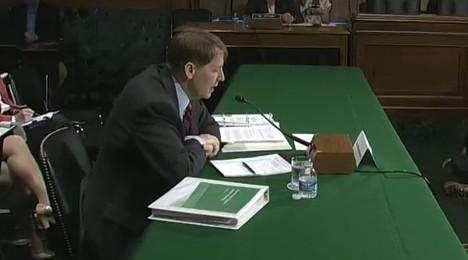Cordray Highlights CFPB Work During Senate Hearing

CFPB director Richard Cordray shared details of the bureau’s semi-annual report with the U.S. Senate Banking Committee on Tuesday.
By subscribing, you agree to receive communications from Auto Remarketing and our partners in accordance with our Privacy Policy. We may share your information with select partners and sponsors who may contact you about their products and services. You may unsubscribe at any time.
WASHINGTON, D.C. –
How the Consumer Financial Protection Bureau conducts its supervisory business was in the spotlight again on Tuesday during regular hearings conducted by both the U.S. Senate Banking Committee as well as the U.S. House Financial Services Committee.
In the Senate, CFPB director Richard Cordray appeared to share details of the bureau’s semi-annual report. In the House, lawmakers discussed a handful of bills primarily sponsored by Republicans that are aimed at how the CFPB is organized and operates.
Cordray highlighted the bureau’s actions since his last appearance, which have included enforcement moves in the vehicle finance space against institutions such as Ally Financial and US Bank. Through the bureau’s enforcement actions to date, Cordray indicated the CFPB has been involved in efforts to refund more than $3.8 billion to consumers who regulators believed to have fallen victim to various violations of consumer financial protection laws.
“The progress we have made has been possible thanks to the engagement of hundreds of thousands of Americans who have used our consumer education tools, submitted complaints, participated in rulemakings and told us their stories through our website and at numerous public meetings from coast to coast,” Cordray told the Senate committee. “We have also benefited from an ongoing dialogue and constructive engagement with the institutions we supervise, as well as with community banks and credit unions, with whom we regularly meet.
“Our progress is also thanks to the extraordinary work of the bureau’s employees — dedicated public servants of the highest caliber who are committed to promoting a healthy and fair consumer financial marketplace. Each day, we work to accomplish the goals of renewing people’s trust in the marketplace and ensuring that markets for consumer financial products and services are fair, transparent and competitive,” he continued.
“These goals not only support consumers in all financial circumstances, but also help responsible businesses compete on a level playing field and reinforce the stability of our economy as a whole,” Cordray went on to say.
Subscribe to Auto Remarketing to stay informed and stay ahead.
By subscribing, you agree to receive communications from Auto Remarketing and our partners in accordance with our Privacy Policy. We may share your information with select partners and sponsors who may contact you about their products and services. You may unsubscribe at any time.
Before Cordray made his appearance, Sen. Tim Johnson — chairman Senate Banking Committee — applauded the work completed by the CFPB.
“We continue our regular oversight of the CFPB. In the three years since the CFPB opened its doors, it has had a noticeable impact on nearly every aspect of the consumer’s experience with the financial system, from student loans to credit cards, mortgages, financial education, debt collection, prepaid cards, and credit reports,” said Johnson, a Democrat from South Dakota.
“The bureau has conducted extensive outreach to both industry and consumers and has proven itself to be a careful regulator, in many cases over industries that previously had no federal supervision. Importantly, the CFPB has also proven itself up to the task Congress set out for it, which is to protect consumers,” he went on to say.
Meanwhile in the other chamber on Capitol Hill, House Financial Services Committee chairman Rep. Jeb Hensarling reiterated many of his concerns about how the CFPB operates when the Texas Republican opened Tuesday’s hearing.
“What we will do is offer bills that will add more transparency and more accountability to both the Financial Stability Oversight Council and the CFPB,” Hensarling said. “And I would just remind my colleagues, particularly those on the other side of the aisle, regardless of how noble a purpose an agency may have, it does not mean it is not in need of accountability and transparency.”


